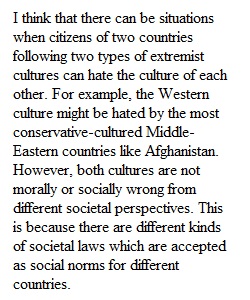


Q Thanks for your contributions, Jane, Chiemerie, and Bhawana. Globalization is evidently a "multifaceted topic," as Chiemerie aptly noted. The issue also provokes or highlights the question: Is cultural contact always or often a good thing? Again, the answer can go both ways. We can learn a lot from other cultures -- practices and ideas that enlarge or enrich our humanity. But that is only if we are open indeed to learn from others. The other tendency is to reject or look down on cultural norms that are different from ours (especially if the degree of difference is pronounced) and to assume that our own cultural values are superior. That is why Jean-Francois Lyotard, a French philosopher, argues that “contact between two communities is immediately a conflict, since the names and narratives of one community are exclusive of the names and narratives of the other.” The contact in this case involves the meeting of two (markedly) different communities, especially in a context in which one community assumes its superiority over the other. I think that Lyotard overstates the case because there can be happy or beneficial cultural contacts. Context (the circumstances or conditions or other such particularities) is important in understanding or analyzing cultural contact and its consequences.
View Related Questions